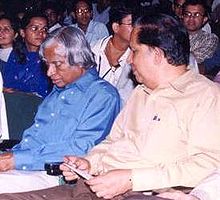G. Madhavan Nair
| G. Madhavan Nair | |
|---|---|

ISRO chief G Madhavan Nair (right) with A. P. J. Abdul Kalam on July 8, 2002
|
|
| Born |
31 October 1943 Kulasekharam, Southern Division, Travancore |
| Residence | India |
| Nationality | Indian |
| Fields | Rocket Technology and Electrical and Electronics Engineering |
| Institutions |
Indian Space Research Organisation Bhabha Atomic Research Center |
| Alma mater | B.Sc. (Engineering - Electrical & Communication) (1966), College of Engineering, Trivandrum |
| Known for | Indian Space Program |
| Notable awards |
Padma Bhushan (1998) Padma Vibhushan (2009) |
G. Madhavan Nair (Malayalam: ജി. മാധവന് നായര്; born October 31, 1943, erstwhile travancore presently Thiruvananthapuram, Kerala) is the former Chairman of Indian Space Research Organisation and Secretary to the Department of Space, Government of India since September 2003 and was also the Chairman, Space Commission. He was succeeded by K. Radhakrishnan. He was also the Chairman of Governing Body of the Antrix Corporation, Bangalore. Madhavan Nair was awarded the Padma Vibhushan, India's second highest civilian honour, on January 26, 2009. He also served as the Chairman, Board of Governors, Indian Institute of Technology Patna until he stepped down voluntarily due to his alleged involvement in Antrix-Devas deal.
Nair was born at Kulashekharam, Kanyakumari, India in a Middle Class Nair Family. He graduated with a B.Sc. in Engineering (1966) from College of Engineering, Trivandrum, of the University of Kerala with specialization in Electronics & Communication Engineering. After his graduation, Nair attended a training program at the Bhabha Atomic Research Center (BARC) Training School, Mumbai.
Nair is a leading technologist in the field of rocket systems and has made significant contribution to the development of multi-stage satellite launch vehicles, achieving self-reliance in independent access to space using indigenous technologies. Nair and his team have advanced their work in the face of several challenges in the regime of technology denials by adopting several innovations and novel techniques to realise world class launch vehicle systems. India today has a pride of place amongst the space-faring nations in launch vehicle technology. Specifically, as Project Director, he led the development of Polar Satellite Launch Vehicle (PSLV) which has since become the workhorse for launching mainly Indian remote sensing satellites.
...
Wikipedia
